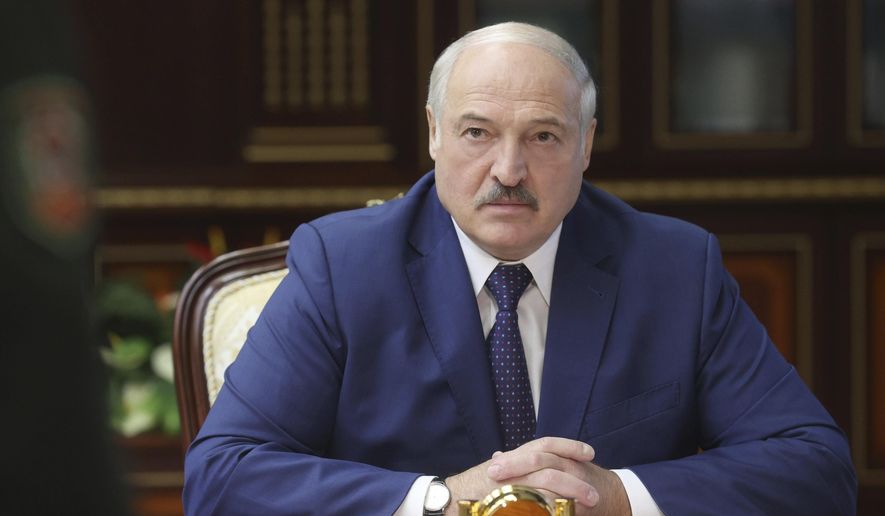Belarusian President Alexander Lukashenko on Wednesday dismissed Western concerns about his country’s joint military exercises with Russia later this month, but the region remains tense with signs of a growing security alliance between Moscow and an isolated and increasingly Kremlin-aligned Minsk.
The Biden administration and Western allies have condemned Mr. Lukashenko’s crackdown on pro-democracy opposition forces in Belarus since a disputed national election a year ago, but the White House has largely been quiet about the growing coziness between Mr. Lukashenko and Russian President Vladimir Putin.
The joint Sept. 10-16 military drills, dubbed the “Zapad” exercises, are held every four years. They are a source of unease among U.S. diplomats and intelligence officials and regional NATO allies such as Lithuania and Poland, the latter of which shares borders with Belarus and Ukraine.
It was not immediately clear whether President Biden discussed the drills with Ukrainian President Volodymyr Zelenskyy during their meeting at the White House on Wednesday.
The Biden administration has sought to emphasize its support of Ukrainian sovereignty in the face of aggression from Russia since Moscow’s forceful annexation in 2014 of Ukraine’s Crimean Peninsula.
Ahead of Mr. Zelenskyy’s Washington visit this week, the administration vowed to provide as much as $60 million more in U.S. military aid to Ukraine to help counter a “major increase in Russian military activity along its border” in recent months.
Some regional analysts say the U.S. and Europe should pay more attention to the sharp shift in Belarus under its authoritarian president, who has ruled the onetime Soviet republic since the mid-1990s. Long accustomed to playing off the Kremlin and the West to preserve his country’s fragile status, Mr. Lukashenko appears to be leaning far more toward Mr. Putin as relations with his European neighbors deteriorate.
An analysis published recently by Atlantic Council fellow Brian Whitmore noted heightened regional concern over the prospect that Mr. Putin may seek to use Zapad 2021 as cover to engage in a further military pressure campaign against Ukraine.
Mr. Lukashenko sought to scuttle such concerns Wednesday. He told Russia’s Tass News Agency that Zapad 2021 will be purely defensive in nature and that the West’s concerns are unfounded.
“We are not going to attack anyone,” Mr. Lukashenko said. “It’s not necessary.”
Still, he sparked unease with a separate interview published Wednesday by his country’s Belta state news agency. He said Russia will soon deliver a large amount of military hardware to Belarus.
“Russia in the near future … will supply us — I won’t say how much money or what — with dozens of planes, dozens of helicopters, the most important air defense weapons,” Mr. Lukashenko said, according to Reuters.
He said the delivery will include “maybe even S-400s,” a surface-to-air missile defense system. Russia has angered Washington and NATO for providing the system to others in recent years.
In a vexing twist, Moscow has sold S-400s to Turkey. The U.S. leveled sanctions against Ankara despite Turkey’s status as a member of NATO.
Although it remains to be seen what Russia will provide over the coming weeks, many regional analysts viewed Mr. Lukashenko’s comments as a sign of Moscow’s strengthening support of the Belarusian president.
Mr. Lukashenko’s crackdown on pro-democracy demonstrations in Minsk and other cities has triggered unease among Belarus’ neighbors, most notably Poland, Lithuania and Ukraine.
“Exercises have sometimes become a source of military aggression,” Polish Deputy Defense Minister Marcin Ociepa told Polish radio on Wednesday.
“We have to be prepared for all scenarios, but today the most probable scenarios are provocations on the border since Russian troops will be located very close to Poland’s borders,” Mr. Ociepa said, according to a report by Ukraine’s Ukrinform state news agency.
The report separately quoted Gen. Ruslan Khomchak, the top Ukrainian armed forces commander, who expressed concern that Zapad 2021 could pose a threat to Ukraine.
U.S. diplomats have been warning for months about the prospect of Russian military expansion into Belarus.
U.S. Ambassador to Belarus Julie D. Fisher, a career Foreign Service officer, told the Senate Foreign Relations Committee in June that it is “important to acknowledge that Russian troops [are] in Belarus. That’s not new. They have been in Belarus for a long time. The question is, how many more?”
Ms. Fisher, who was confirmed to her post before Mr. Biden took office, said U.S. officials will be watching Zapad 2021 “very closely to see how this exercise will unfold, what kinds of troops and equipment move into Belarus and how much of that leaves.”
Analysts have also speculated whether the Russian military is seeking to expand its number of bases in Belarus.
The Atlantic Council analysis by Mr. Whitmore cited regional reports saying Russia and Belarus had announced plans to establish three permanent joint military training centers in Russia’s Nizhny Novgorod and Kaliningrad regions and in Belarus’ western Grodno region, which borders Poland and Lithuania.
“Significantly,” Mr. Whitmore wrote, “Lukashenko now appears ready to drop his long-standing objection to a new Russian airbase on Belarusian territory.”
• Guy Taylor can be reached at gtaylor@washingtontimes.com.




Please read our comment policy before commenting.